Dentures – Edison, NJ
Affordable, Customized, and Detailed Tooth Replacement
When you’re missing teeth, chewing certain foods becomes a daily hassle. As a result, you’re forced to micromanage your diet, both at home and with friends. On top of that, you might not feel as inclined about showing off your smile when multiple and even all teeth are missing. Thankfully, Signature Smiles at Edison offers personalized dentures for those with all levels of tooth loss! Dr. Shah is always prepared to work with you when you’re ready for a denture, whether it’s your first one or you’re replacing an old version! Call our dental office today and we’ll get you scheduled for a one-on-one consultation to discuss options for dentrues in Edison, NJ.
Why Choose Signature Smiles at Edison for Dentures?
- Young, Caring and Vibrant Team Members
- Improved Planning via Advanced CBCT Scanning Technology
- Bilingual Team Ensures More Comfortable Communication
Is a Denture Right for Me?

Generally, it doesn’t take much to be a good dentures candidate. Most patients can qualify for treatment if they suffer from tooth loss. Even so, you’ll want to consult with Dr. Shah to confirm things. He and his team will determine if dentures suit you. If they don’t, though, don’t worry; you can qualify later with preliminary dental work. Alternatives to dentures are also possible. To get further details, just keep reading or call our office today.
Effects of Missing Teeth

Before considering denture candidacy, you should review the causes and effects of tooth loss. Doing so helps you see how treatment can help.
Ultimately, many factors can contribute to missing teeth. One potential cause is decay, which can erode a tooth until it falls out or needs extraction. Another is gum disease – a condition that wears down the ligaments that keep teeth in place. Patients can also lose a tooth if it’s damaged by an accident or injury.
Regardless of the causes, however, tooth loss always has severe effects. First, various everyday tasks – especially eating, speaking, and smiling – get harder. Besides that change, unseemly smile gaps also emerge. These spaces, in turn, also cause adjacent teeth to tilt and fall.
What Qualifies You for Dentures?

True enough, most with tooth loss can get dentures. That being said, there are other qualifying factors worth assessing.
For instance, take oral health. A denture will only work if you have healthy gum and jaw tissue. (Lacking these deprives the appliance of support.) Meanwhile, your still-existing teeth can also make dentures worthwhile. After all, the latter can help if the former are decayed or sensitive.
Something else to note is how many teeth you’ve lost. Based on the exact number, you’ll need a partial or full denture. The partial type only replaces a few teeth at most. As for the full kind, it restores all the pearly whites along the upper or lower arch.
Last but not least, consider your budget as well. Dentures happen to be cheaper than other oral restorations. Consequently, they’re ideal for those who need low-cost care.
Alternative Tooth-Replacement Options

If Dr. Shaw decides you aren’t a good dentures candidate, it’s okay. We at Signature Smiles offer several other tooth-replacement options. The most common of these treatments are:
- Dental Bridges – A dental bridge is a fixed restoration. Made of crowns fused to a pontic (i.e., false tooth), it uses surrounding teeth for support. As such, the appliance only replaces a few pearly whites at a time.
- Dental Implants – Dental implants are titanium posts that replace tooth roots. Given this fact, dentists place them directly in the patient’s jaw sockets. The posts then gradually fuse with the jawbone. In light of these traits, though, implants depend on healthy bone tissue to work. They can also get expensive.
Types of Dentures

Missing teeth don’t have to affect your life forever. Thanks to dentures, you can enjoy a complete and fully functioning smile once again! A tried-and-true solution, this method of tooth replacement is a great way to restore a complete bite. Plus, the prosthetics are designed to appear more natural and feel more comfortable than ever before.
Partial Dentures
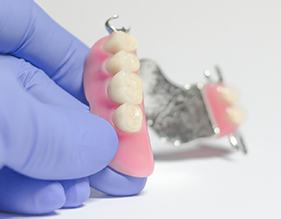
If you’re only missing one or two teeth, you may want to consider partial dentures. As the name suggests, these are designed to only replace a few teeth. The prosthetic is attached with a clasp to your remaining natural teeth. A gum-colored base and custom-made set of prosthetic teeth are used to seamlessly complete your existing smile. In the end, you’ll have a result that is both entirely functional and beautiful!
Full Dentures
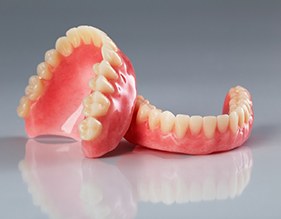
Do you need more than a few teeth replaced? Full dentures are likely the ideal choice for you! Like partials, they have a discreet, gum-colored base and prosthetic teeth that look very natural. The only difference is that this restorative solution is held in place with natural suction, denture adhesive, or a mixture of both.
Implant Dentures
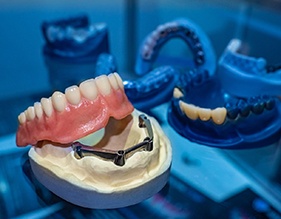
Some patients want a durable and more stable solution than traditional dentures. Well, that’s where implant dentures come in! They combine the best qualities of dentures and state-of-the-art dental implants.
Instead of staying in place through clasps or natural suction, your prosthetic is attached to a titanium post that is surgically inserted into the jawbone. Over time, these implants will naturally fuse with the surrounding bone tissue via osseointegration. Their unique placement will allow you to enjoy maximum stability and avoid unwanted movement.
How Dentures are Made

If you’re getting dentures, you may want to learn how they’re made. That’s a fair concern – it only makes sense to know what went into your new teeth. Luckily enough, we at Signature Smiles can address that matter: below is a summary of denture parts and how labs make and combine them. By reading it, you’ll see how our office creates top-quality dental prosthetics. You’d then have a deeper appreciation for smile restoration!
What are Dentures Made Of?

No matter the type, all dentures have two essential parts: the base and the artificial teeth. Each component is vital to the overall appliance. To learn why that’s the case, consider their features as described:
- Denture Base – A denture’s base supports its artificial teeth. As such, it’s pink-colored and sits on a patient’s gums to blend with the surroundings. Labs can typically make one from various materials, including acrylic, nylon, porcelain, resin, or metal.
- Artificial Teeth – Dentures’ artificial teeth (per their name) are the prosthetic’s tooth-replacing portions. They’re typically made from resin or porcelain to ensure lifelike results. That said, porcelain is the more popular material because it looks and feels like natural teeth.
The Denture Creation Process

To be clear, every denture is custom-made for a patient’s unique mouth. That means making each one requires a multi-step process. As for what the steps are, they include:
- Step 1: The dentist performs an oral exam and takes an impression of your gums. Afterward, the impression is sent to an offsite lab fabricating the dentures.
- Step 2: Following an initial crafting period, the dental lab will send wax dentures to the dentist/prosthodontist for a fitting. Assuming patient and dentist approval, the restorations are returned to the lab for completion.
- Step 4: A technician will boil down the returned dentures to remove their wax portions. The appliance is then placed in a flask, into which plaster will later flow. The flask is then placed in hot water to melt the dentures.
- Step 5: A lab worker makes holes in the artificial teeth, ensuring new material can attach. A liquid separator is also added to the plaster layer to prevent the acrylic from sticking. The same acrylic is then injected into the flask to replace the wax.
- Step 6: The lab worker will remove the plaster to reveal the prosthetics. Later, they place the dentures in an ultrasonic bath to remove leftover plaster.
- Step 7: After cutting away excess acrylic, the technical polishes the restorations
- Step 8: The patient returns to the office for fitting and final adjustments.
Adjusting to Your New Dentures

Once you start wearing dentures, you may feel some slight discomfort. This symptom is normal – it may even manifest as moderate soreness or a struggle to eat or speak. Still, the minor discomfort is unnatural. You should ease it as soon as possible to assess your treatment results.
Of course, you can speed up the adjustment as needed. Habits like eating soft foods, and avoiding cavities, are trivial enough. These practices would make eating easier and lower your potential discomfort.
Whatever your final choice, though, be careful. You may need to visit a dental practice if your aches persist. Should that happen, you might need replacement restorations.
The Benefits of Dentures

Dentures can provide immense benefits for the oral and overall health as well as the confidence of almost anyone who is missing multiple teeth. Tooth loss can make it difficult to speak clearly, chew thoroughly, and smile confidently, and dentures can transform a person’s life by restoring their smile. Here’s how these modern dental prosthetic appliances from our Edison office can help people who have lost several, many, or all of their teeth.
Psychological Benefits

People who have lost all their teeth often find it hard to accept how it affects their smiles, making it more difficult for them to engage socially and maintain a positive self-image and more likely for them to experience depression or sadness. Using dentures to restore a patient’s smile can bolster their confidence and boost their willingness to participate in social events by reducing anxieties about speaking, eating, and appearance.
Clearer Enunciation

The teeth play a crucial role in how the human mouth forms words, and the loss of even one can make it more difficult to form certain sounds during speech. Since dentures function in the place of a patient’s lost teeth, they can allow them to speak more clearly after tooth loss. While it can take a little while to get used to speaking with dentures, it will feel increasingly natural with practice. A great way to get used to speaking with dentures more quickly is to read a favorite book out loud and repeat troublesome words.
Improves Nutrition

Tooth loss can limit a person’s chewing ability, making it difficult for them to enjoy nutritious fare such as crisp and snappy fruits and veggies, crunchy nuts, and fibrous and marbly steaks. This can make it much more difficult for them to nourish their body adequately and leads many of them to experience indigestion or malnutrition. By improving chewing ability, dentures can allow a patient to enjoy a diverse diet of wholesome foods that keeps their body healthy.
Preserves Oral Health

Dentures can help prevent a patient’s remaining natural teeth from shifting out of position so they can remain easy to clean and less likely to be infected. These appliances can also take much of the chewing pressure off the natural teeth, which can minimize the wear and tear they endure.
Expands Opportunities

Your smile stands out when you make a first impression, and presenting the best grin possible can help you get an interaction or relationship off to a favorable start. Dentures can help you smile confidently at job interviews or sales opportunities so you can create rapport and project a sense of self-assuredness, trustworthiness, and competence. In one study conducted in 2019, participants were found to be less likely to be employed if they had poor oral health, so restoring your lost teeth may be one of the best investments you can make for your career.
Dentures Aftercare
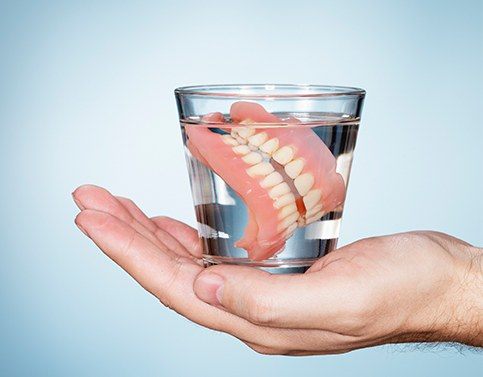
Dentures are an excellent option for those who have suffered from extensive tooth loss. However, it’s important that you take steps to keep them in good shape. To make your denture last as long as possible, Dr. Shah will go over the most essential at-home care tips to keep in mind. Here are some of the ones that you can expect.
Removable Dentures
Remove After Eating

After you finish your meals and snacks throughout the day, you should remove your dentures to give them a rinse. This is to ensure that all of the food debris is washed away. When you are rinsing your dentures, make sure that the water that you are using isn’t too hot. High temperatures can cause the dentures to become warped, meaning that they will no longer properly fit.
Clean Your Restoration
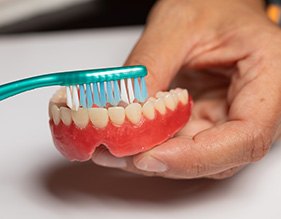
Remove your dentures to clean them. Using a soft-bristled toothbrush and a small amount of hand soap, mild dish soap, or denture cleanser, gently brush your dentures. Don’t use regular toothpaste because the material that dentures are made from can’t withstand its abrasiveness. If you aren’t going to be wearing your dentures again right away, put them into a container of water or denture-cleansing solution so they don’t dry out and lose their shape. Remember to rinse your dentures thoroughly before putting them back in.
Keep Your Dentures Safe
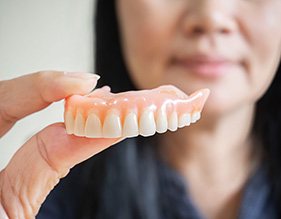
While cleaning your dentures, it’s a good idea to place towel beneath you. This way, if your dentures slip out of your hands, they are less likely to become damaged. You should also be careful to keep your dentures in a place that is out of reach of pets and small children.
Remove Dentures When You Sleep
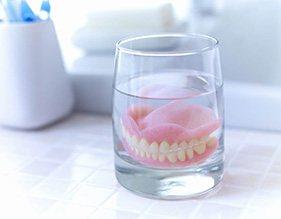
When it’s bedtime, take your dentures out. Wearing them restricts the circulation in your gums and can lead to soft-tissue irritation. Sleeping with dentures has been associated with a higher risk of pneumonia in addition to higher levels of gum and tongue plaque. Overnight, keep your dentures in a denture-soaking solution so they don’t lose their shape.
Notice Changes

Be on the lookout for changes so you can address them with your dentist. This includes mouth sores, gum irritation, or anything else that is bothering you. If you notice any shifting, clicking, or other signs that your dentures aren’t fitting properly, this is something you should bring to our attention.
All-on-4 Dental Implants

For All-on-4 dental implants, the process looks a little bit different. You should brus them with a soft-bristled toothbrush and non-abrasive toothpaste. Remember to also floss your replacement teeth every day. You may also want to consider purchasing a water flosser. For extra freshness, use an anti-bacterial mouthwash.
Understanding the Cost of Dentures

Missing teeth can affect multiple aspects of your life. Fortunately, tooth-replacement options like dentures in Edison can allow you to enjoy a strong and healthy bite once again. Before moving forward with the process, you probably want to know how much it will cost. Since every case is unique, it’s impossible to provide an accurate price estimate until you come in for an exam. Following your appointment, you’ll have a much better understanding of what you can expect to pay.
Factors that Affect the Cost of Dentures

Several factors influence the overall cost of dentures in Edison. Some of those include:
- Any preparatory work needed beforehand (i.e., tooth extractions, gum disease therapy, etc.)
- Number of teeth you’re missing
- Materials your denture will be made of (i.e., porcelain or acrylic)
Patients on a budget may be tempted to get a cheaper denture, but it’s important to remember that you get what you pay for. More affordable prosthetics tend to break easily and require a replacement much sooner than anticipated. When it comes to dentistry, it’s always best to invest in high-quality work.
Are Implant Dentures More Expensive?

Yes, but it’s because implant dentures require oral surgery and the placement of multiple dental implants. Because of their unique placement inside the jawbone, implant dentures are far more reliable for day-to-day use. They will stay firmly in place and will help stimulate the jawbone, providing you with increased biting strength and longevity. Another significant benefit is that implant dentures can last decades, while traditional ones will need to be replaced every five to seven years.
Does Dental Insurance Cover Dentures?

You’ll be happy to know that most dental insurance plans offer coverage for dentures in Edison because they’re considered a major procedure. Usually, you can expect around 50% of their cost to be covered. Of course, every policy is unique, which means the exact percentage can vary from person to person. Make sure you confirm the details of your coverage with your insurance provider before committing to anything. If needed, our team is more than happy to help with that process!
Other Options for Making Dentures Affordable

If you don’t have dental insurance, you may think you’re stuck paying the entire cost of dentures in Edison out-of-pocket. Well, you’re in luck! At Signature Smile, we offer additional financing options to help make your treatment as affordable as possible, such as:
- In-House Dental Plan: For a flat monthly rate, you can get the preventive care you need and enjoy sizeable discounts on other treatments we offer! You get the benefits of traditional dental insurance without the red tape.
- Care Credit Financing: This option allows you to split up the total cost of your treatment into smaller monthly installments. Best of all, most payment plans come with little to no interest attached!
Denture FAQs

As an experienced denture dentist in Edison, NJ, Dr. Shah understands that extensive tooth loss is often emotionally harrowing. He and the rest of our team at Signature Smiles at Edison strive to provide our patients with all of the information they need to make the right decision regarding tooth replacement. That’s why we have included the answers to a handful of denture-related questions that we get asked the most frequently. If you don’t find the information you’re looking for on this page, feel free to call us; we’ll also answer any of your questions during your consultation.
Will It Hurt to Get Dentures?
When you first receive your dentures, it’s perfectly normal to experience some irritation and soreness as your mouth gets used to the new appliance. For most patients, this adjustment process lasts for a few weeks, but it may take a few months for others. It might take even longer if you were wearing a denture before and have to grow accustomed to a new one.
After providing you with your denture, Dr. Shah will give you personalized guidance on adjusting to it, including how long you can expect discomfort to last. If it persists for longer than that, be sure to call us. The denture may not fit correctly, or there might be an underlying oral health issue that must be addressed.
What Qualifies You for Dentures?
The requirements for getting each of the three types of dentures – partial dentures, full dentures, and implant dentures – are different. Partials are ideal for patients who still have most of their teeth left; maybe they lost some teeth due to malnutrition, a health issue, or an unfortunate accident. Full dentures are offered when a patient is already missing all of their teeth or none of their teeth are worth salvaging. A full or partial denture can be secured onto dental implants if the patient has adequate jawbone density or is willing to undergo a bone graft.
What Is the Average Age for Dentures?
Despite the stereotype, tooth loss is not an inevitable part of the aging process. That being said, it’s far more common in older patients. According to the National Center for Health Statistics, about 66% of adults between the ages of 40 and 64 have lost at least one tooth, compared to only 33% of adults aged 20 to 39. Additionally, the American Dental Association found that almost 57% of people aged 65 to 74 currently wear some type of denture.
While the need for tooth replacement generally increases with age, people of all ages might potentially be candidates for dentures in Edison.
How Long Will You Have to Wait to Get Dentures After Your Teeth Are Pulled?
On average, you’ll have to wait between six and eight weeks to get dentures after getting your teeth pulled. This recovery period gives the gums time to heal as well as time for us to make sure that the dentures fit properly. Of course, the exact timeline varies based on the kind of denture you’re receiving. If you’re getting implant dentures, you’ll likely have to wait four to six months for the implants to merge with your jawbone via osseointegration.
